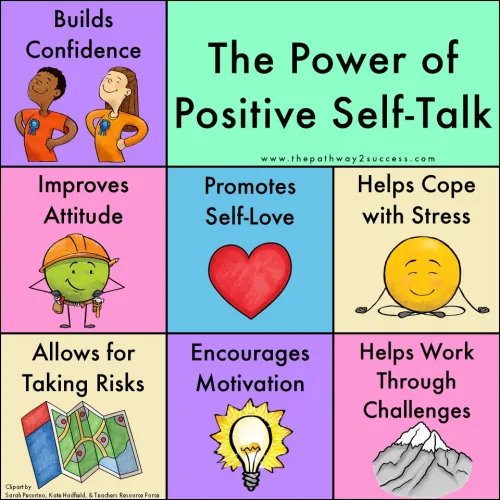Image Source: Pathway 2 Success
South Africa – Have you ever experienced that inner dialogue speaking to you? It feels like a constant presence, murmuring in the background of our minds.
Its words can sometimes uplift and motivate us, offering inspiration, comfort and support. Yet, it may adopt a critical tone on other occasions, amplifying our fears and uncertainties.
This internal dialogue, known as our inner monologue, comprises our ongoing conversations with ourselves, whether we consciously recognise them or not. It serves as a medium through which we interpret, navigate, and evaluate our capabilities and comprehend the complexities of daily life.
But can we harness control over it, despite its internal nature? Absolutely, through a process known as self-talk. Often unnoticed, this vague voice — sometimes loud, sometimes subtle — holds significant sway over our overall well-being, depending on whether its messages are positive or negative.
Given the demands and obstacles of everyday life, resisting the pull of negativity can prove challenging. External circumstances frequently influence our internal narratives.
When we internalise negative experiences, we risk succumbing to feelings of anxiety, stress and despair. Approaching challenges from a mindset already steeped in negativity allows it to permeate our subconscious, perpetuating a harmful cycle.
To the extent that the following day arrives, leaving us unprepared and lethargic. We drag ourselves out of bed, limbs heavy and minds foggy, as if the weight of the previous day’s negative self-talk has infiltrated our very being, sapping our energy and zest.
Imraan Choonara of the Africa Muslims Agency aptly noted that by succumbing to this pattern, we relinquish control over our minds and, consequently, ourselves. Allowing our inner monologues to foster distress, anxiety, and pessimism contradicts our inherent nature which is to be and to do.
“Here’s the scary part, if you don’t consciously control what you’re saying to yourself, you are allowing other factors to control what you are saying to yourself. You’re allowing circumstances that surround you, other people’s opinions and the media to control what you’re saying to yourself.”
SMread| The Palestinian Chronicles – Gaza’s Cry for Aid Met with Israeli Onslaught
Overcoming Negative Self-Talk with Positive Self-Talk
One of the most damaging consequences of negative self-talk is its ability to instil self-doubt and diminish self-esteem and confidence by continually highlighting failures.
While breaking free from this pattern may seem challenging, taking control and stopping it is possible. It requires a willingness to make an effort and to take the leap.
How can we accomplish this? By intentionally cultivating our mindset, becoming aware of our internal dialogue, and substituting negative thoughts with positive affirmations. Though seemingly simple and straightforward, sometimes it takes a small effort to achieve significant change.
Choonara emphasised that in self and mindset development, we should not tolerate demeaning, derogatory, or vulgar language from ourselves, just as we wouldn’t accept it from external sources. Such language should be rejected because it often does not reflect reality and is untrue.
Instead, we should cultivate love, honour, and respect for ourselves, acknowledging our inherent worth and purpose and showing compassion when necessary.
By altering our mindset, we inadvertently transform our speech, which, in turn, influences our actions. As a result, we may experience increased energy, improved self-esteem, and greater control over our lives and the challenges they present.
“You do speak to yourself through your own thoughts and you are speaking to yourself in your own voice. Why would you not want to give yourself the best odds possible? … Yes, there’s a lot going on around the world, but you and I have a responsibility first; before serving humanity, we have to be grateful for the people we are and who we’ve been created to be. We have to respect ourselves and our minds so that when we are the best us, then we can be good to others.”
